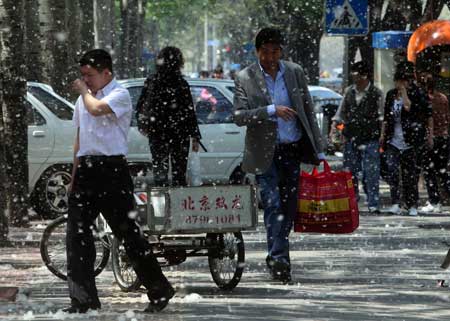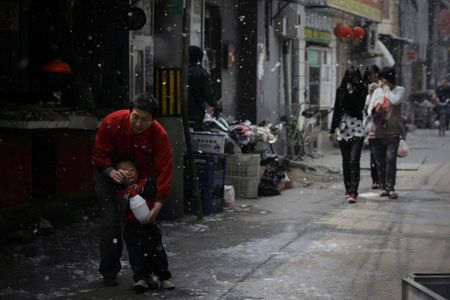Peking University, Apr. 16, 2011: Every Beijing spring brings a snowfall of fuzz from the capital's poplar and willow trees, but this year the government has no plans to take unusual steps to reduce catkins.
"We launched big catkin-destroying campaigns in previous years at parks and on some main roads, but that probably won't happen this year," Li Xuan, spokesman of the Beijing Municipal Bureau of Landscape and Forestry, said on Thursday. He explained it would take two or three years before those trees start producing catkins again.

People try to ward off cotton-like fuzz, or catkins, from poplars in Tuanjiehu, Chaoyang District. The catkins filled the sky around the city during the 2010 May Day holiday. (File photo/Legal Mirror)

A man and his son spray water in a Dongsishitiao hutong to prevent catkins from drifting in the air. (File photo/CFP)
"Killing catkins is a process that violates the rules of nature, as we have to change the gender of the trees," he added.
Catkins are produced by certain types of poplars and willows that are dioecious, meaning they are male or female. Only female poplars and willows produce catkins, said Li.
"We have to change all female trees into male ones in order to stop the production of catkins," Li said.
Generally, the city has adopted two means of bringing catkins under control: injecting "medicine" into female poplars and grafting the tops of male willow trees onto females. Both procedures change the genders of the trees, according to Li.
Figures from the landscape and forestry bureau showed that there were 2 million poplars and 1.2 million willows in the capital as of 2005.
While some residents enjoy the catkin season, more and more have taken to wearing masks to keep from inhaling the white fuzz, and some even burn or spray the floaters down with water, according to a Legal Mirror report on Thursday.
Li said residents' claims that catkins are the source of their allergies are groundless.
"There is no evidence to show they could cause or worsen any respiratory diseases," said He Quanying, a Peking University People's Hospital respiratory department professor.
Reported by: Zhang Hui
Edited by: Jacques
Source: Global Times